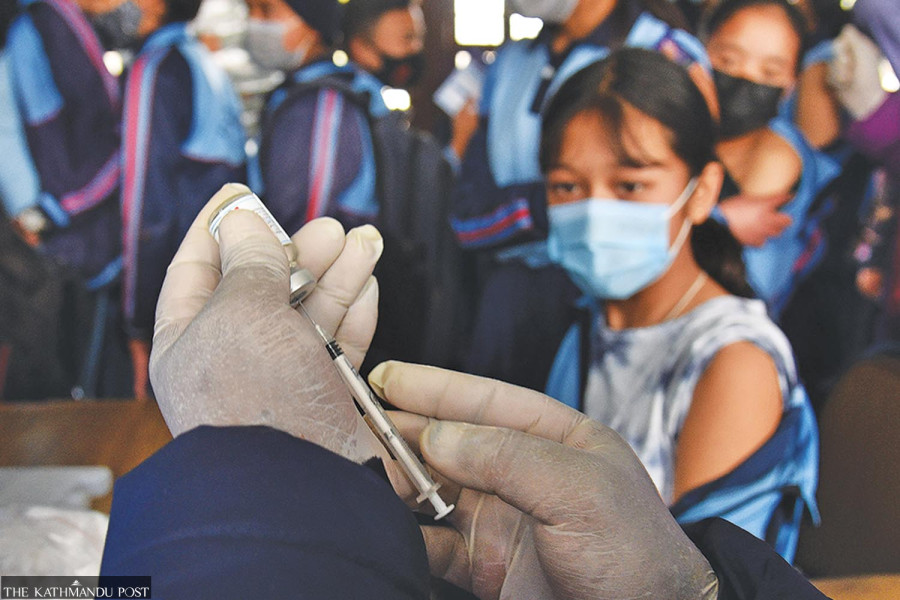Health
Thousands of paediatric Covid-19 doses expire
As health workers refused to give shelf life-extended jabs to children aged 5 to 11, many are still deprived of shots.
Arjun Poudel
As health authorities failed to increase the uptake of shelf life-extended vaccine jabs, thousands of paediatric doses of the Pfizer-BioNTech Covid-19 vaccine supplied to health facilities throughout the country have expired.
Officials at the Ministry of Health and Population concede that even immunisation workers refused to abide by the government decision to inoculate children between five and 11 with the shelf life-extended vaccine doses.
“I cannot tell the exact number of doses that went to waste, but we had hundreds of thousands of such doses in stock,” an official at the health ministry said, asking not to be named as the person is not authorised to speak to the media. “We let thousands of vaccine doses expire while there are countless children of the target age group who are yet to get the vaccine doses.”
The health ministry had started inoculating children between five and 11 from June last year after the COVAX facility supplied 8.4 million doses of Pfizer-BioNTech vaccine.
The expired doses are part of the 8.4 million doses supplied by the international vaccine sharing scheme led by the United Nations.
A source at the health ministry said that Bagmati Province had over 40,000 vaccine doses in stock, Gandaki Province had 8,400 and Sudurpaschim Province had 38,400 doses that were not used.
“Vaccine doses were supplied to local units; the local health officials are yet to report on the expired doses,” another official at the Department of Health Services told the Post on the condition of anonymity.
The shelf life of the vaccine doses had expired on November 23.
Health authorities throughout the country had resumed vaccination to children of the said age group even after the expiry date of the vaccine came close. But due to low uptake of the jab due to various reasons, including the decline in Covid-19 infection rate, around half a million doses of the vaccine had remained in government storages.
The health ministry had decided to continue vaccination even after the jabs expired, citing decisions of regulatory agencies of other countries.
“We are informed that even immunisation workers did not cooperate to administer jabs,” said Dr Bibek Kumar Lal, director at the Family Welfare Division under the Department of Health Services. “The decision to administer the vaccine doses after their expiry date was seconded by the National Immunisation Advisory Committee, a Cabinet decision and it was in line with the decisions of the regulatory agencies of several countries.”
Last year, the United States Food and Drug Administration extended the shelf-life of the Pfizer Covid-19 vaccine from six to nine months when the vaccine was stored at a temperature of minus 90 to minus 60 degrees Celsius.
Currently, health authorities in Nepal have been using Pfizer-BioNTech’s bivalent Covid-19 vaccine supplied by COVAX.
People above 55 years, health workers, pregnant women, those with compromised immunity and people suffering from chronic diseases are on the priority list to get the Pfizer-BioNTech’s bivalent Covid-19 vaccine as their second booster jab.
The bivalent Covid-19 vaccine includes a component of the original virus strain as well as a part of the Omicron variant to provide broad protection against Covid-19.
The vaccine is called bivalent Covid-19 shot as it contains two components—original virus strain and Omicron BA.4 and BA.5 sub-variants. Doctors say a bivalent Covid-19 vaccine may also be referred to as an “updated” Covid-19 vaccine booster dose.
So far, Nepal has used Covid-19 vaccines developed by the University of Oxford and the pharmaceutical giant AstraZeneca, manufactured in various countries of Europe, India and Japan; the Chinese Vero Cell; and the US-made Janssen, Moderna, and Pfizer-BioNTech.
As many as 12,020 Covid-related deaths have been reported in Nepal, according to the official count.




 9.12°C Kathmandu
9.12°C Kathmandu














